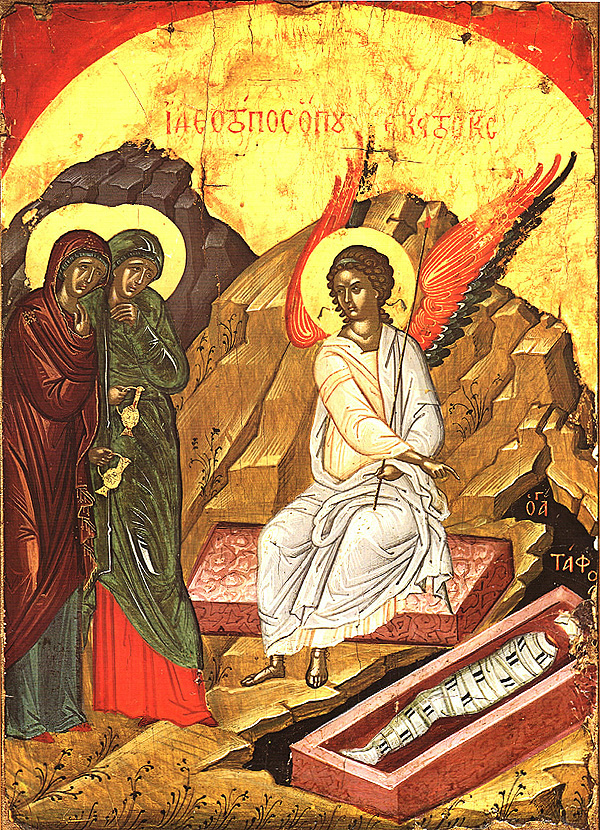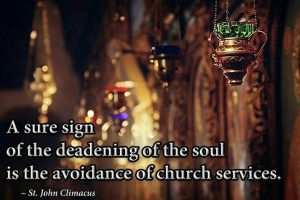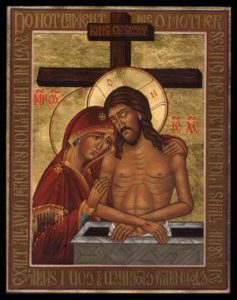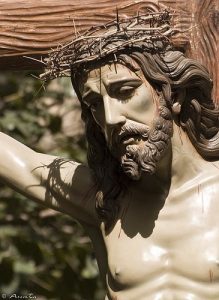Category: Lent & Holy Week
Beginning of the Season of Lent
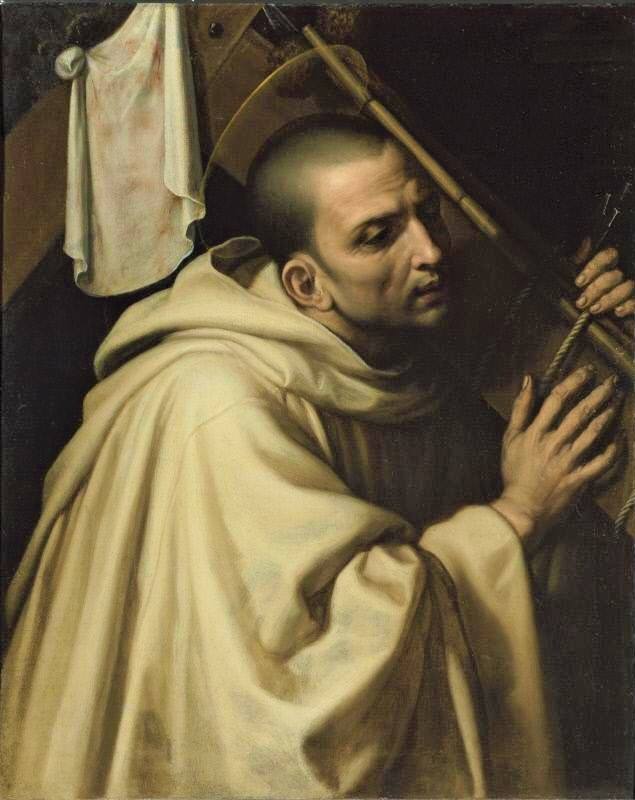 The Latin Church begins the holy season of Lent with joy and sobriety today. Eastern Christians who follow the Gregorian calendar began their lenten observance on Monday past. The priest prays at the prayer after communion: “Pour out a spirit of compunction, O God, on those who bow before your majesty, and by your mercy may they merit the rewards you promise to those who do penance.” Thus, the season of repentance is for our purification of sin by God’s grace and specific acts of piety: prayer, fasting and almsgiving. This letter of Pope St Clement I to the Corinthians may be helpful to you.
The Latin Church begins the holy season of Lent with joy and sobriety today. Eastern Christians who follow the Gregorian calendar began their lenten observance on Monday past. The priest prays at the prayer after communion: “Pour out a spirit of compunction, O God, on those who bow before your majesty, and by your mercy may they merit the rewards you promise to those who do penance.” Thus, the season of repentance is for our purification of sin by God’s grace and specific acts of piety: prayer, fasting and almsgiving. This letter of Pope St Clement I to the Corinthians may be helpful to you.
“Let us fix our attention on the blood of Christ and recognize how precious it is to God his Father, since it was shed for our salvation and brought the grace of repentance to all the world.
If we review the various ages of history, we will see that in every generation the Lord has offered the opportunity of repentance to any who were willing to turn to him. When Noah preached God’s message of repentance, all who listened to him were saved. Jonah told the Ninevites they were going to be destroyed, but when they repented, their prayers gained God’s forgiveness for their sins, and they were saved, even though they were not of God’s people.
Under the inspiration of the Holy Spirit, the ministers of God’s grace have spoken of repentance; indeed, the Master of the whole universe himself spoke of repentance with an oath: “As I live”, says the Lord, “I do not wish the death of the sinner but his repentance.” He added this evidence of his goodness: “House of Israel, repent of your wickedness. Tell the sons of my people: If their sins should reach from earth to heaven, if they are brighter than scarlet and blacker than sackcloth, you need only turn to me with your whole heart and say, “Father, and I will listen to you as a holy people.”
In other words, God wanted all his beloved ones to have the opportunity to repent and he confirmed this desire by his own almighty will. That is why we should obey his sovereign and glorious will and prayerfully entreat his mercy and kindness. We should be suppliant before him and tum to his compassion, rejecting empty works and quarreling and jealousy which only lead to death.
Brothers, we should be humble in mind, putting aside all arrogance, pride and foolish anger. Rather, we should act in accordance with the Scriptures, as the Holy Spirit says: “The wise man must not glory in his wisdom nor the strong man in his strength nor the rich man in his riches. Rather, let him who glories glory in the Lord by seeking him and doing what is tight and just.” Recall especially what the Lord Jesus said when he taught gentleness and forbearance. “Be merciful,” he said, “so that you may have mercy shown to you. Forgive, so that you may be forgiven. As you treat others, so you will be treated. As you give, so you will receive. As you judge, so you will be judged. As you are kind to others, so you will be treated kindly. The measure of your giving will be the measure of your receiving.”
Let these commandments and precepts strengthen us to live in humble obedience to his sacred words. As Scripture asks: “Whom shall I look upon with favor except the humble, peaceful man who trembles at my words?”
Sharing then in the heritage of so many vast and glorious achievements, let us hasten toward the goal of peace, set before us from the beginning. Let us keep our eyes firmly fixed on the Father and Creator of the whole universe, and hold fast to his splendid and transcendent gifts of peace and all his blessings.”
Image: St Bernard of Clairvaux by Jerónimo Jacinto Espinosa
Holy Monday … set your sights on things above
You, then, beloved, if you have risen with Christ, seek the things that are above, where Christ is sitting at the right hand of God. Set your minds on things that are above, not on things that are on earth.
Then, as Christ rose from the dead by the glory of the Father, so you too may walk in newness of life. Then you may rejoice to pass from the secular pleasures and the consolations of the world, through the compunction and sadness that are of God to holy devotion and spiritual exultation, by the gift of the one who passed from this world to the Father and who deigns to draw us after himself, and to call us into Galilee, that he may show us himself, who is God over all, Blessed forever.
Sermons for Lent and the Easter Season
Saint Bernard of Clairvaux
At the door on Palm Sunday
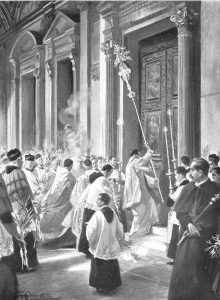 In the ancient form of the Holy Week rites (i.e., prior to the Holy Week reforms of Pius XII in the early 1950’s) there is a very brief yet beautiful ceremony that occurs on Palm Sunday when the procession goes outside the church, the doors to the church are closed. The door of the church is then knocked on three times with the shaft of the processional cross. Having served the Mass, I can say it is a powerful and moving rite of which Benedict XVI spoke:
In the ancient form of the Holy Week rites (i.e., prior to the Holy Week reforms of Pius XII in the early 1950’s) there is a very brief yet beautiful ceremony that occurs on Palm Sunday when the procession goes outside the church, the doors to the church are closed. The door of the church is then knocked on three times with the shaft of the processional cross. Having served the Mass, I can say it is a powerful and moving rite of which Benedict XVI spoke:
“In the old liturgy for Palm Sunday, the priest, arriving in front of the church, would knock loudly with the shaft of the processional cross on the door that was still closed; thereupon, it would be opened. This was a beautiful image of the mystery of Jesus Christ himself who, with the wood of his Cross, with the power of his love that is given, knocked from the side of the world at God’s door; on the side of a world that was not able to find access to God. With his Cross, Jesus opened God’s door, the door between God and men. Now it is open.”
Homily of Pope Benedict XVI
Palm Sunday, 2007
Blessed Holy Week — a week of great and divine drama!
A sure sign
In Christ we overcame the devil
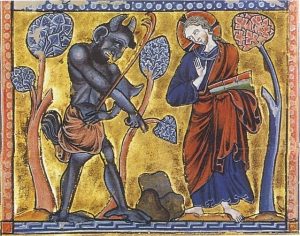 In this First Week of Lent St Augustine gives us something worthy for our reflection: In Christ we suffered temptation, and in him we overcame the devil.
In this First Week of Lent St Augustine gives us something worthy for our reflection: In Christ we suffered temptation, and in him we overcame the devil.
Hear, O God, my petition, listen to my prayer. Who is speaking? An individual, it seems. See if it is an individual: I cried to you from the ends of the earth while my heart was in anguish. Now it is no longer one person; rather, it is one in the sense that Christ is one, and we are all his members. What single individual can cry from the ends of the earth? The one who cries from the ends of the earth is none other than the Son’s inheritance. It was said to him: Ask of me, and I shall give you the nations as your inheritance, and the ends of the earth as your possession. This possession of Christ, this inheritance of Christ, this body of Christ, this one Church of Christ, this unity that we are, cries from the ends of the earth. What does it cry? What I said before: Hear, O God, my petition, listen to my prayer; I cried out to you from the ends of the earth. That is, I made this cry to you from the ends of the earth; that is, on all sides.
Why did I make this cry? While my heart was in anguish. The speaker shows that he is present among all the nations of the earth in a condition, not of exalted glory but of severe trial.
Our pilgrimage on earth cannot be exempt from trial. We progress by means of trial. No one knows himself except through trial, or receives a crown except after victory, or strives except against an enemy or temptations.
The one who cries from the ends of the earth is in anguish, but is not left on his own. Christ chose to foreshadow us, who are his body, by means of his body, in which he has died, risen and ascended into heaven, so that the members of his body may hope to follow where their head has gone before.
He made us one with him when he chose to be tempted by Satan. We have heard in the gospel how the Lord Jesus Christ was tempted by the devil in the wilderness. Certainly Christ was tempted by the devil. In Christ you were tempted, for Christ received his flesh from your nature, but by his own power gained life for you; he suffered insults in your nature, but by his own power gained glory for you; therefore, he suffered temptation in your nature, but by his own power gained victory for you.
If in Christ we have been tempted, in him we overcame the devil. Do you think only of Christ’s temptations and fail to think of his victory? See yourself as tempted in him, and see yourself as victorious in him. He could have kept the devil from himself; but if he were not tempted he could not teach you how to triumph over temptation.
From a commentary on the psalms by Saint Augustine, bishop
(Ps. 60, 2-3: CCL 39, 766)
Mortification of the flesh for the good
Spiritual Reading for Lent 2018
 We are at the beginning the season of Great Lent. May I commend to you these titles for your spiritual reading and meditation (listed in no particular order):
We are at the beginning the season of Great Lent. May I commend to you these titles for your spiritual reading and meditation (listed in no particular order):
Alexander Schmemann, Great Lent
Richard John Neuhaus, Death on a Friday Afternoon: Meditations on the Last Words of Jesus from the Cross
Flannery O’Connor, A Prayer Journal
John Behr, Becoming Human
Brother Lawrence, The Practice of the Presence of God
Jean-Pierre de Caussade, The Sacrament of the Present Moment
Frederica Mathewes-Green, The Illumined Heart
Frank Sheed, Theology for Beginners
Peter Kreeft, Your Questions, God’s Answers
C.S. Lewis, The Screwtape Letters
Pope Benedict XVI, Holy Days: Meditations on the Feasts, Fasts, and Other Solemnities of the Church
Pope Benedict XVI, Jesus of Nazareth: Holy Week: From the Entrance Into Jerusalem To The Resurrection
Which books would you recommend for Lent?
Sorrowful Mother
“Do not lament me, O Mother, seeing me in the tomb, the Son conceived in the womb without seed, for I shall arise and be glorified with eternal glory as God. I shall exalt all who magnify thee in faith and in love.”
~Ode IX, Holy Saturday Matins/Paschal Nocturns
(Icon of the Mater Dolorosa by the hand of Cheryl Pituch, Robert, LA)
Good Friday
“What is it to believe?” asked the Welsh poet, Waldo Williams. He answers, “Giving solace / Until deliverance arrives.”
Today, Good Friday, we come to a deeper aware that “This is the Lord; we have waited for him; let us be glad and rejoice in his salvation.”
By your passion and cross we are, indeed, brought to communion.
